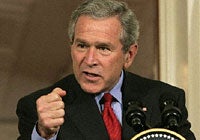Our security is dependent on sacrifice, Bush tells America

In a bid to rally faltering public faith in his leadership, President George Bush has insisted the war in Iraq was worthwhile and the insurgents were failing, and that success was vital to America's future security.
In his keenly awaited prime-time television address, Mr Bush acknowledged that many Americans were wondering whether the US should be involved in a war in which more than 1,730 US servicemen, not to mention tens of thousands of Iraqis, have died.
"There will be tough moments which test America's resolve," the President told hundreds of troops at the Fort Bragg army base in North Carolina, which has 9,300 men in Iraq. "But the sacrifice is worth it, and it is vital to the future security of our country." With his popularity tumbling, and a majority of the US public telling pollsters the 2003 invasion was a mistake, Mr Bush stepped up his efforts to present Iraq as part of the much more popular "war on terror" that began on 11 September 2001.
The terrorists, he said, "can kill the innocent, but they cannot stop the advance of freedom". The only way they could win was if America forgot the lessons of 11 September "If we abandon the Iraqi people to men like [Abu Musab] al-Zarqawi, and yield the future of the Middle East to men like Osama bin Laden."
Mr Bush's speech marked the first anniversary of the return of sovereignty to an Iraqi government, amid growing fears that the US is being sucked into a Vietnam-style morass. It coincided with a new poll showing that more than 60 per cent of Americans do not believe the White House has a clear plan for victory, that would allow the 138,000-strong US force in Iraq to return home.
Last night, the President again insisted that a clear timetable for withdrawal would play into the insurgents' hands. But yet again, his speech had to compete with death and destruction on the ground, in Iraq and Afghanistan. In Iraq, at least 12 died in various attacks across the country, among them an influential Shia legislator and a US soldier.
In Afghanistan, a Chinook helicopter had crashed while on an anti-guerrilla mission in the north-east. There was no immediate word of the fate of the at least 15 soldiers on board the craft, which a Taliban spokesman claimed had been shot down by rebels.
In Iraq, the murder of Sheik Dhari Ali al-Fayadh, a member of the parliament elected last January, was also claimed by insurgents, this time in a message purporting to be from al-Qa'ida. Whoever was responsible, however, the attack will only inflame tensions between minority Sunnis and the Shia majority, as negotiations for a new constitution enter a critical phase.
Separately yesterday, 1,000 US troops and Iraqi security forces launched "Operation Sword" to crush insurgents in western Iraq the third major offensive there in recent weeks. It remains to be seen whether this operation, or the "stay-the-course" call from Mr Bush, will have an effect.
The resistance is as stubborn as ever fuelled, say US commanders and administration spokesmen, by a continuing inflow of foreign fighters across Iraq's long border with Syria.
Nearly 1,400 people, mostly Iraqis, have been killed in the past two months alone, since the Shia dominated government of Ibrahim al-Jaafari, the Prime Minister, took office on 28 April. But the administration contends, as Condoleezza Rice, the Secretary of State, put it yesterday, that the daily violence and killings obscure "the quiet process ... of building a political consensus toward a stable and democratic Iraq". Before the Fort Bragg speech, Mr Bush met families of 33 US servicemen who died in Iraq and Afghanistan.
The new batch of polls has only underscored the President's problems. An ABC/Washington Post poll found a majority of Americans accept that the US cannot withdraw its forces from Iraq as demanded by some on the left. But a clear majority also believes the insurgency is growing stronger. According to a separate CNN/USA Today Gallup poll, Mr Bush's job approval rating has plunged to 45 per cent, the lowest of any second-term president since Richard Nixon. By a 53-46 majority, Americans believe the invasion of Iraq was a mistake. Most damning, 61 per cent believe the US has no clear plan to handle the crisis.
Join our commenting forum
Join thought-provoking conversations, follow other Independent readers and see their replies
Comments
Bookmark popover
Removed from bookmarks